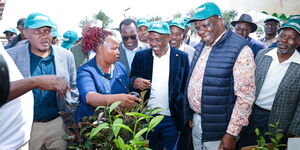Two of President William Ruto's allies Nelson Koech and John Kaguchia were on Monday, May 15 hard-pressed to explain skewed state appointments.
Appearing on Citizen TV's Day Break, KANU political affairs secretary Fredrick Okango accused president Ruto of favouring members from only two regions of the country in public appointments.
The Belgut Member of Parliament defended Ruto, giving an example of appointment of General Ogolla as Chief of Defence Forces.
“There was widespread speculation about why General Ogolla couldn't succeed General Kibochi, and it was incumbent on President Ruto to explain why it was appropriate for General Ogolla to head the CDF,” Koech stated.
At the same time Mukurweini MP John Kaguchia defended Ruto, explaining that when looking at the ethnic layout of appointments, it was also necessary to look at the population matrix, since communities have different populations in the country.
Okango challenged Koech and Kaguchia, emphasizing that as Azimio, they would want to see balanced public appointments that reflect the face of Kenya.
“We in Azimio believe public appointments must reflect the ethnic and regional diversity of the people of Kenya,” he stated.
Okango was referring to an earlier statement by deputy president Rigathi Gachagua about shareholders in government, where he explained that if there existed shareholders indeed, then they should come from all regions of the country and not from one community or region.
“We have seen discussions on social media about government appointments, favouring only members from two communities, Kenyans have been asking themselves if there are Kenyans from other communities who are suitable for the jobs,” Okango narrated.
At the same time, Alego Usonga MP Samuel Atandi echoed Okango’s sentiments, adding that there were Kenyans from other parts of the country with qualifications and experience for public appointments.
Atandi lamented that members from his constituency had missed out on government appointments and urged the President to consider distributing the public appointments equally in all constituencies in the country.
The Alego Usonga legislator also stated that President Ruto erred in linking the events that happened at Bomas to General Francis Ogolla, adding that it tainted his reputation.
On the other hand, Okango regretted that the issue of Chief of Defence Forces had to be discussed during a live TV interview with President Ruto, when it was a matter that could have been handled privately by the military.
Archbishop of the Anglican Church Jackson Ole Sapit on May 10, castigated President William Ruto over what they termed as tribal appointments to State Corporations.
Ole Sapit faults Ruto
Bishop Ole Sapit raised concerns that the Kenya Kwanza administration was violating the Constitution that demands for diversity in State appointments.
“There is glaring tribalism and cronyism, particularly with regard to public appointments,” stated Ole Sapit.
A report by the Public Service Commission released in 2020 revealed that 80 per cent of public service positions were held by employees from six communities.
A report on the ethnic and regional distribution of high cadre jobs in the Government showed the Kikuyu, Kalenjin, Luo, Luhya, Kamba and Kisii dominate these plum positions.
Out of the 416 top management positions in the civil service, members of Kikuyu community holds 120, which was 29 percent.
The Kalenjin community had 11 per cent (45) of the total workforce, while Luo was third with 41 employees, which was equivalent to 10 per cent of the total workforce at the top management in government.
Luhya, Kamba, Meru and Kisii tribes each had a representation of eight per cent, six per cent, six per cent and five per cent in that order.












